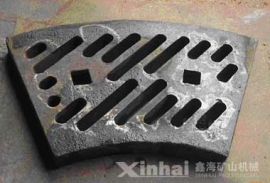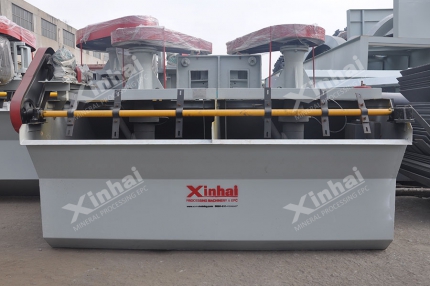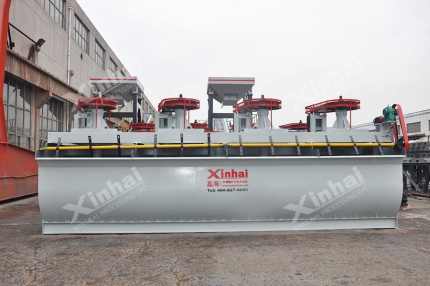China has abundant feldspar resources, mainly potash feldspar, but few feldspar minerals meet industrial needs. Most feldspar ores also contain quartz, mica, rutile, magnetite, hematite, limonite, and some even contain minerals such as apatite, pyrite, tourmaline, etc. In order to improve the industrial value of feldspar, its separation and impurity removal are essential.

According to the property and composition of the ore, the processing flow of potash feldspar includes the following steps: crushing, washing and desliming, separation, and dewatering process.
Use the table of contents below to navigate through the guide:
01The crushing operation of potassium feldspar
The crushing operation of potash feldspar mainly includes crushing and grinding, which can be divided into dry and wet methods. Generally, the efficiency of wet grinding is higher than that of dry grinding, and over-grinding is less likely to occur. This step should not only meet the requirements of the impurity removal process but also meet the requirements of product size.

02The washing and desliming operation of potassium feldspar
The purpose of the washing operation is mainly to remove impurities such as clay, fine mud and mica in potassium feldspar, reduce the content of F2O3 in potash feldspar, and increase the potassium and sodium content. This step is mainly used for weathered granite or feldspathic potassium feldspar ore. It uses the vibrating screen or washing tank to separate impurities from coarse-grained feldspar under the action of water flow.

The purpose of desliming is to remove the primary slime in potash feldspar ore and the slime from the grinding stage through equipment such as desliming buckets, hydrocyclones, etc. This slime will affect the subsequent flotation, magnetic separation and other separation operations. Especially for the flotation using amine collectors, this slime will not only reduce the separation effect but also consume a large amount of collector.

03The separation of potassium feldspar
1. The magnetic separation of potash feldspar
Since the iron minerals, biotite, tourmaline, etc. in potash feldspar have certain magnetic properties, magnetic separation is an important separation process for feldspar separation. Generally, these minerals have relatively weak magnetic properties, so the strong magnetic separation process and equipment can be used.

2. The flotation separation of potash feldspar
Flotation has a good effect on improving the quality of potash feldspar products. It can not only remove iron and titanium minerals in potash feldspar, but also realize the separation of feldspar and quartz. For different impurities, the flotation reagents used are different.

(1) When separating potassium feldspar and mica, reverse flotation process is often used, which can reduce the loss of feldspar in mica flotation. Generally, reverse flotation is used under acidic or alkaline conditions, but a majority of processing plants mostly use amine cationic collectors for reverse flotation under acidic conditions.
(2) When separating potash feldspar and quartz, acid flotation, neutral flotation, and alkaline flotation can be used
a) The acid flotation: under the action of pH=2-3, use anion and cation mixed collector to preferentially separate potassium feldspar in flotation process;
b) The neutral flotation: use amine cationic collector to collect potassium feldspar in natural neutral medium;
c) The alkaline flotation: under the condition of pH=11-12, use alkaline earth metal ions as the activator, and the alkyl sulfonate collector to collect quartz in reverse flotation process.
3. The acid leaching process of potassium feldspar
Acid leaching is also an effective way to remove potassium feldspar impurities. High-concentration sulfuric acid is often used for leaching at a high temperature for a long time to remove iron impurities. It is often suitable for impurities in potassium feldspar with a fine embedded crystal structure.

4. Combined processing processes of potassium feldspar
For the hard-to-select potash feldspar ore with high iron content or some iron minerals penetrating the feldspar cleavage in the form of iron staining, a single processing method is difficult to meet requirements. Then a combined processing process, such as magnetic-flotation separation, reverse flotation-strong magnetic separation, etc., can often achieve better separation effects than a single processing method.

04The dewatering process of potassium feldspar
After the potassium feldspar concentrate product is obtained by separation, the potash feldspar fine powder is obtained as the product directly by thickening, filtering and dewatering with a thickener. The tailings produced in the process of separation can be used for resource utilization or dry stacking through tailings re-processing and dry discharge.

The above are the processes of potash feldspar. In actual production, it should be noted that the mineral composition of potash feldspar, product requirements and other conditions have an important influence on the selection of its process. Therefore, before the construction of the processing plant, it is necessary to conduct processing tests. The process flow and supporting equipment should be selected scientifically and reasonably according to the test results to achieve the ideal benefits.


 marketing@ytxinhai.com
marketing@ytxinhai.com  0086 13810327080
0086 13810327080 






































































































 CHAT
CHAT MESSAGE
MESSAGE











